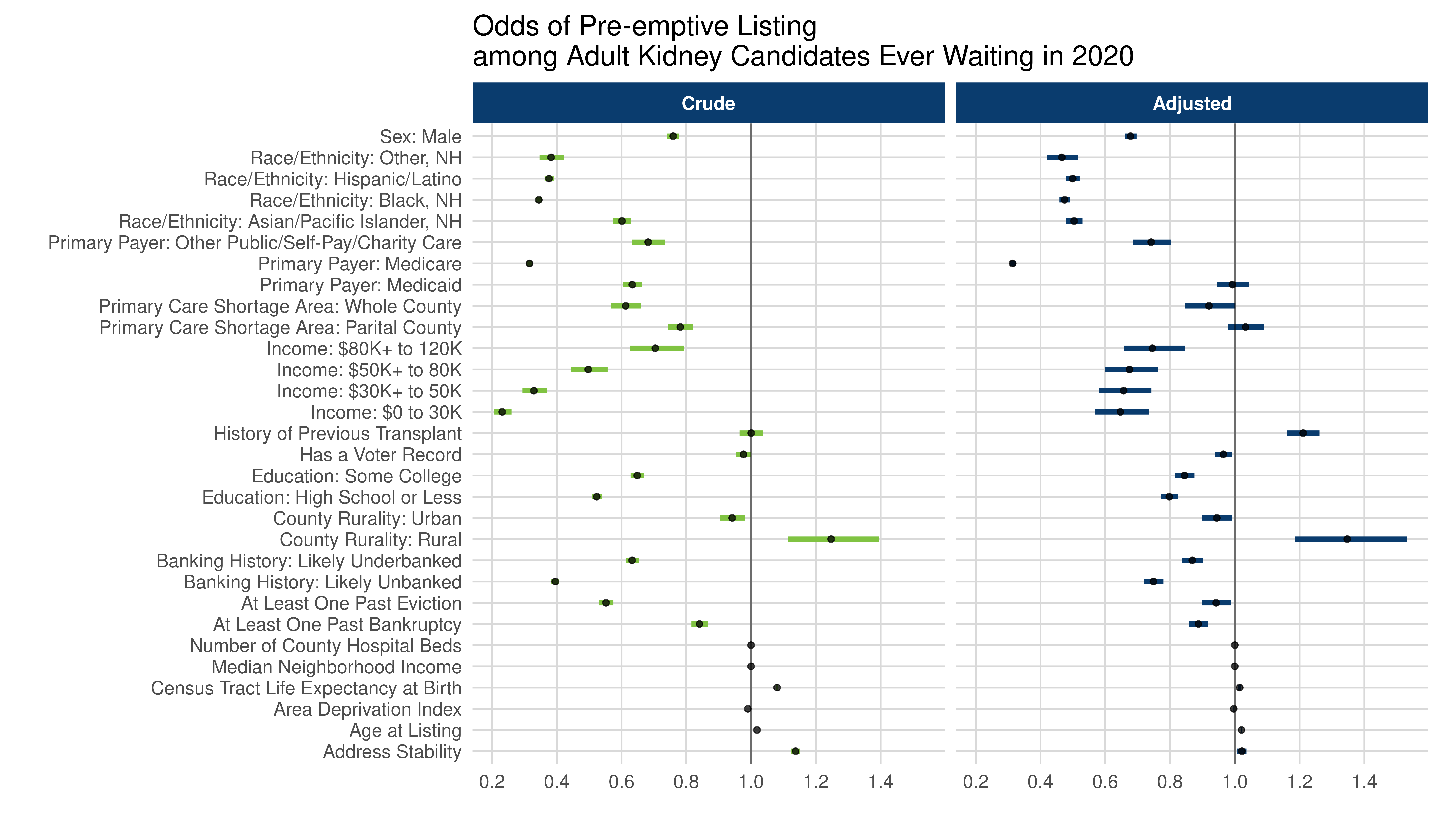Social Determinants of Health Are Associated with Pre-Emptive Wait Listing and Do Not Fully Account for Racial Gap in Early Access to the Waitlist
1Research Department, United Network for Organ Sharing, Richmond, VA, 2Research Department, UNOS, Richmond, VA
Meeting: 2022 American Transplant Congress
Abstract number: 515
Keywords: African-American, Kidney transplantation, Public policy, Waiting lists
Topic: Clinical Science » Kidney » 50 - Health Equity and Access
Session Information
Session Name: Health Equity and Access II
Session Type: Rapid Fire Oral Abstract
Date: Tuesday, June 7, 2022
Session Time: 5:30pm-7:00pm
 Presentation Time: 6:40pm-6:50pm
Presentation Time: 6:40pm-6:50pm
Location: Hynes Ballroom C
*Purpose: We leveraged a novel data linkage of candidate-level indicators of social determinants of health (SDOH) among kidney waitlist candidates in the United States to study socioeconomic and health disparities contexts of pre-emptive listing.
*Methods: We supplemented Organ Procurement and Transplantation Network (OPTN) data on adult kidney candidates ever waiting in 2020 with address data and proprietary, person-level SDOH data obtained from a private data vendor. We further linked this dataset to sources of county-level health professional shortage areas, tract-level estimated life expectancy, and a block group-level index of neighborhood deprivation. We imputed missing values for key variables using a predictive mean matching methodology. Crude and adjusted logistic regression models using the pooled imputed data assessed odds of listing for transplant before the initiation of dialysis. Age at listing, race/ethnicity, sex, and history of prior transplant were included in the final model, in addition to eight candidate-level SDOH indicators and six measures capturing the SDOH of candidates’ local geographies.
*Results: Individual factors most strongly associated with decreased odds of pre-emptive listing in this cohort of 110,490 candidates included Medicare (aOR = 0.31, CI = 0.30-0.32) and being Black (aOR = 0.47, CI = 0.46-0.49), Hispanic (aOR = 0.50, CI = 0.48-0.52), or Asian/Pacific Islander (aOR = 0.50, CI = 0.48-0.53). Odds of pre-emptive listing also decreased with decreases in estimated income, with the lowest income group having the lowest odds (aOR = 0.65, CI = 0.57-0.74). Living in a rural county, older age, and previous transplant increased adjusted odds of pre-emptive listing, and for each one year increase in county life expectancy, the adjusted odds of pre-emptive listing increased by 1.5% (CI = 1.0-2.0%). Critically, after adjustment for an array of social determinants, the effect estimates for all non-White racial/ethnicity groups only partially attenuated.
*Conclusions: Access to transplant literature extensively discusses pre-emptive listing as a driver of kidney health disparities. This early analysis of SDOH data from a novel waitlist linkage confirms that even when accounting for individual-level socioeconomic factors and the profiles of candidates’ communities, racial/ethnic disparities persist in this critical part of the waitlisting pathway. Clinicians and policymakers should consider the root causes of this racial/ethnic disparity and the degree to which SDOH factors do not fully account for it.
To cite this abstract in AMA style:
Zehner AM, Cartwright LA, Mupfudze T, Wilson T, Placona A, Carrico B. Social Determinants of Health Are Associated with Pre-Emptive Wait Listing and Do Not Fully Account for Racial Gap in Early Access to the Waitlist [abstract]. Am J Transplant. 2022; 22 (suppl 3). https://atcmeetingabstracts.com/abstract/social-determinants-of-health-are-associated-with-pre-emptive-wait-listing-and-do-not-fully-account-for-racial-gap-in-early-access-to-the-waitlist/. Accessed February 16, 2026.« Back to 2022 American Transplant Congress

